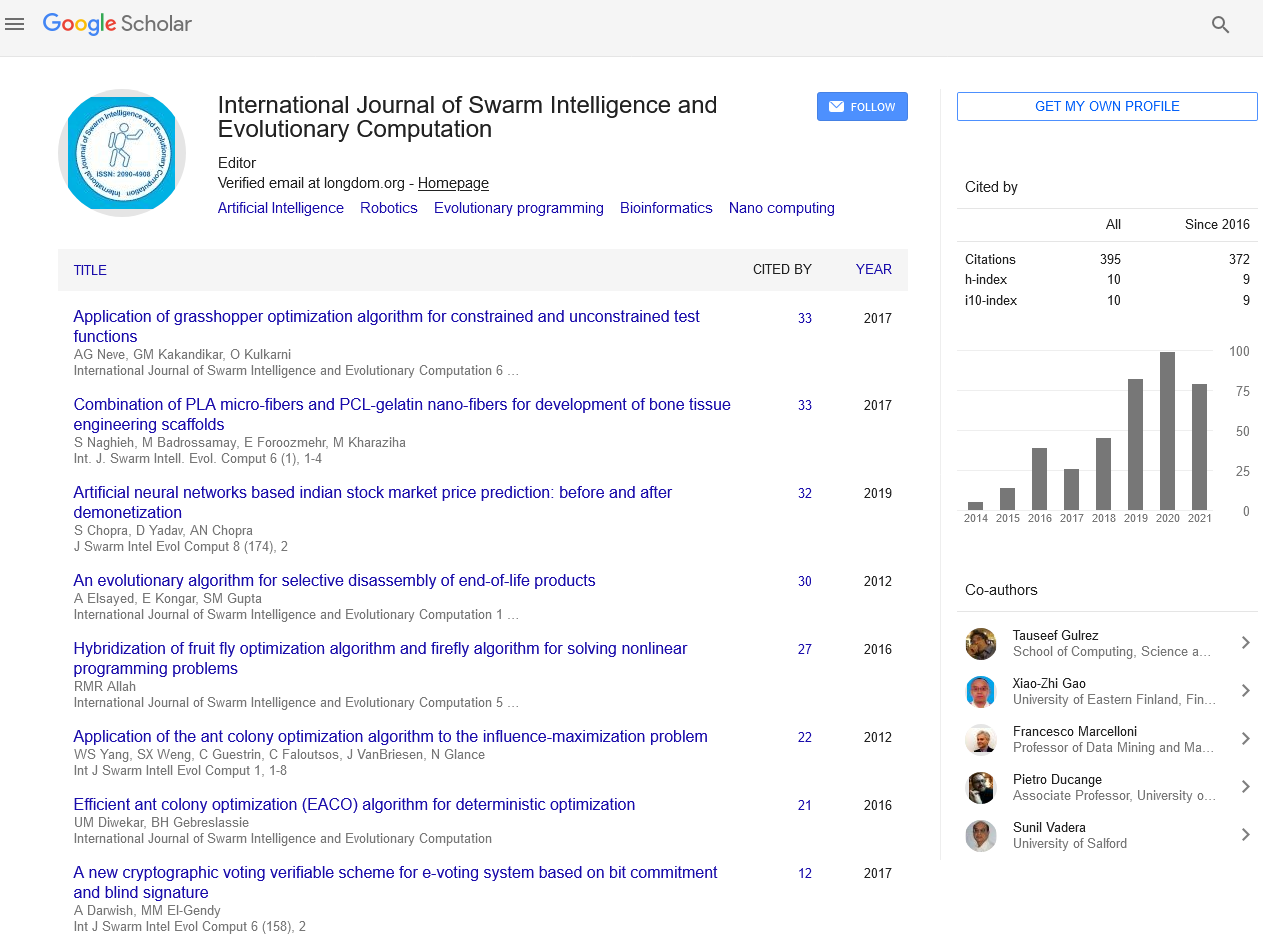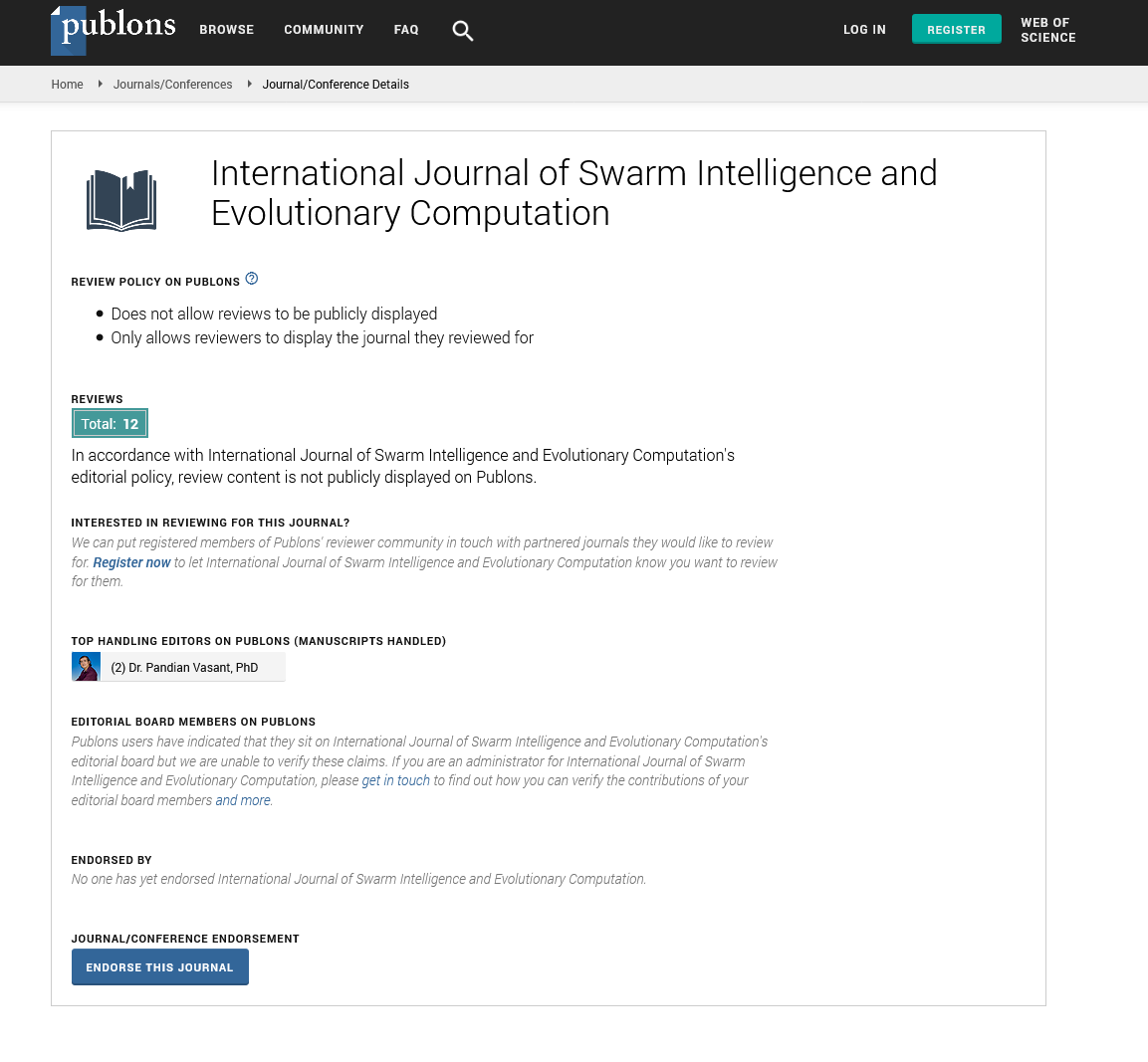Indexed In
- Genamics JournalSeek
- RefSeek
- Hamdard University
- EBSCO A-Z
- OCLC- WorldCat
- Publons
- Euro Pub
- Google Scholar
Useful Links
Share This Page
Journal Flyer

Open Access Journals
- Agri and Aquaculture
- Biochemistry
- Bioinformatics & Systems Biology
- Business & Management
- Chemistry
- Clinical Sciences
- Engineering
- Food & Nutrition
- General Science
- Genetics & Molecular Biology
- Immunology & Microbiology
- Medical Sciences
- Neuroscience & Psychology
- Nursing & Health Care
- Pharmaceutical Sciences
Opinion Article - (2025) Volume 14, Issue 1
Goal-Driven Swarm Intelligence: The Role of AI in Coordinating Decentralized Multi-Agent Systems
Sheng Lin*Received: 12-Feb-2025, Manuscript No. SIEC-25-28696; Editor assigned: 28-Feb-2025, Pre QC No. SIEC-25-28696 (PQ); Reviewed: 28-Feb-2025, QC No. SIEC-25-28696; Revised: 07-Mar-2025, Manuscript No. SIEC-25-28696 (R); Published: 14-Mar-2025, DOI: 10.35248/2090-4908.24.14.414
Description
While Swarm Intelligence is characterized by the autonomy of its individual agents and the emergence of global behavior from local interactions, Artificial Intelligence can play a critical role in orchestrating and guiding these swarms towards the achievement of specific, predefined objectives. AI algorithms, particularly those within the realms of reinforcement learning, evolutionary computation, and meta-heuristics, can be strategically employed to design and fine-tune the rules and parameters that govern the behavior of individual swarm agents. This allows for a degree of high-level control and direction over the emergent collective intelligence, enabling us to harness the power of swarms for targeted outcomes.
For instance, in the context of Particle Swarm Optimization, an AI system could be used to dynamically analyze the performance of the swarm in a complex search space. By monitoring metrics such as convergence speed, solution diversity, and exploration-exploitation balance, the AI could intelligently adjust parameters like the inertia weight (controlling the influence of past velocity), the cognitive coefficient (influencing the agent's attraction to its own best position), and the social coefficient (influencing the agent's attraction to the swarm's best position). This dynamic parameter adaptation, driven by AI, can significantly enhance the efficiency and effectiveness of the PSO algorithm in finding optimal or near-optimal solutions. Similarly, in the domain of robotic swarms, an overarching AI system can provide high-level mission goals and dynamically allocate tasks to individual robots based on their capabilities and the evolving state of the environment. While the individual robots might utilize SI principles for low-level tasks like navigation, obstacle avoidance, and local coordination, the AI acts as a central planner, ensuring that the swarm's collective efforts are aligned with the overall mission objectives. This hierarchical architecture, combining the flexibility and robustness of SI at the individual agent level with the goal-orientedness and analytical power of AI at a higher level, represents a powerful paradigm for tackling complex real-world problems.
The integration of AI as an orchestrator allows us to move beyond simply observing and leveraging the naturally occurring emergent behaviors of swarm systems. It empowers us to actively shape and direct this collective intelligence towards the achievement of specific, well-defined goals. This hybrid approach holds immense potential across a wide range of applications, including autonomous robotics performing intricate tasks in dynamic environments, optimizing complex logistical operations with fleets of interconnected vehicles, and developing sophisticated control systems for large-scale distributed networks. By intelligently guiding the behavior of swarm systems through the application of AI techniques, we can unlock a new era of intelligent automation and problem-solving.
At the heart of swarm intelligence lies emergence—complex global behavior resulting from the interaction of simple agents following local rules. These systems excel at distributed problem-solving, environmental exploration, and adaptive response to dynamic conditions. However, they typically lack an inherent mechanism for aligning their behavior with abstract, long-term goals. For example, a group of autonomous drones might distribute themselves across a region using basic repulsion and attraction forces, but this spatial distribution alone does not guarantee task efficiency unless guided by an overarching strategy.
In real-world applications, swarms are rarely left to self-organize entirely on their own. Whether in disaster response, planetary exploration, environmental monitoring, or autonomous traffic systems, swarms are expected to fulfill mission-specific objectives. This introduces the need for a coordination mechanism that can translate global goals into local agent behaviors without resorting to centralized control. The challenge is thus to preserve the decentralized nature of the swarm while enabling purposeful, high-level coordination.
Citation: Lin S (2025). Goal-Driven Swarm Intelligence: The Role of AI in Coordinating Decentralized Multi-Agent Systems. Int J Swarm Evol Comput. 14:414.
Copyright: © 2025 Lin S. This is an open-access article distributed under the terms of the Creative Commons Attribution License, which permits unrestricted use, distribution and reproduction in any medium, provided the original author and source are credited


